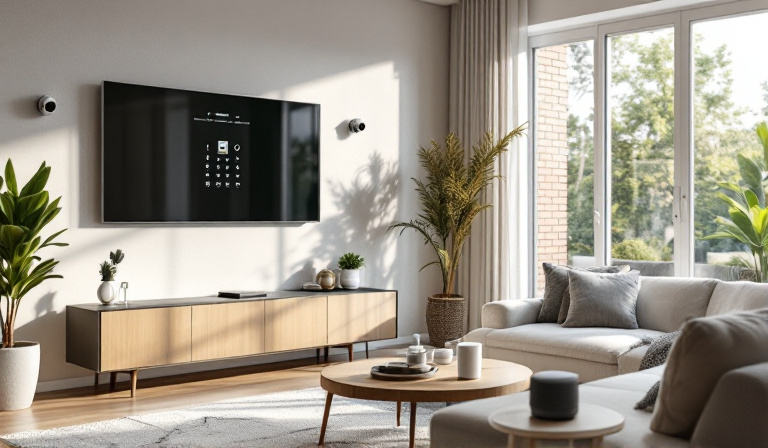
In a world where security is of paramount importance, safeguarding your home is more critical than ever. Home security is not just about installing a few gadgets; it's about creating a comprehensive system that provides peace of mind and protects both your loved ones and your belongings. From alarms to surveillance systems, and smart home integrations, understanding the intricacies of home security can empower you to make informed decisions. Let's dive deep into the world of home security and explore how to effectively secure your home.
Understanding the Basics of Home Security
Home security encompasses a range of measures to deter burglars, alert homeowners to potential threats, and provide real-time monitoring. The foundation of any security system is understanding what you need to protect and how best to protect it. This involves evaluating your home’s vulnerabilities, knowing the types of security systems available, and understanding how they work together to provide a cohesive solution.
Types of Home Security Systems
Home security systems come in various forms, each with unique features and benefits. Here’s an overview of the most common types:
- Monitored Security Systems: These systems are connected to a monitoring service that alerts authorities when an alarm is triggered. They offer 24/7 protection and are ideal for those who want professional oversight.
- Unmonitored Security Systems: These systems trigger a loud alarm when breached but rely on you or a neighbor to alert authorities. They are often more affordable and offer a basic level of protection.
- Wireless Security Systems: Easy to install and often more versatile than wired systems, wireless security systems use radio signals to communicate between components.
- Wired Security Systems: These systems are hardwired into your home’s electrical system, providing reliable, interference-free security, though installation can be more complex and costly.
- Smart Home Security Systems: Incorporating the latest technology, these systems can be controlled via smartphone apps and integrated with other smart home devices for comprehensive control.
Key Components of a Home Security System
A robust home security system comprises several critical components, each playing a vital role in safeguarding your home:
- Control Panel: The control hub of your security system, allowing you to arm or disarm the system and communicate with each installed component.
- Motion Detectors: These sensors detect movement within a designated area, triggering an alarm if unauthorized motion is detected.
- Door and Window Sensors: Installed on entry points, these sensors trigger an alarm when a door or window is opened unexpectedly.
- Surveillance Cameras: Providing real-time video feed, these cameras allow you to monitor your property remotely and capture evidence in case of an intrusion.
- Alarm Sirens: Designed to scare off intruders and alert neighbors, these loud sirens activate when the system detects a breach.
- Yard Signs and Window Stickers: Simple yet effective, these deterrents inform potential intruders that your home is protected by a security system, reducing the likelihood of a break-in.
Integrating Smart Technology
The advent of smart technology has revolutionized home security, making it more accessible and efficient. Smart security systems allow you to control and monitor your home remotely via a smartphone app. Features like real-time alerts, smart locks, and integration with other smart home devices such as lights and thermostats can enhance your home's security and convenience.
Consider investing in smart locks that allow keyless entry and can be controlled remotely. Smart doorbells with built-in cameras provide a clear view of who is at your door, even when you're not home. Additionally, smart lighting can be programmed to mimic your presence, deterring potential intruders.
Tips for Choosing the Right Home Security System
Selecting the right home security system can be daunting, given the myriad of options available. Here are some tips to help you make the right choice:
- Assess Your Needs: Consider the size of your home, your neighborhood's safety, and your budget. A larger home might require more extensive coverage, while a smaller apartment might need just a few key components.
- Research Providers: Look into different security companies and read reviews to find a reliable provider with excellent customer service and support.
- Look for Scalability: Choose a system that can grow with your needs. As technology evolves, you might want to add new devices or features.
- Consider DIY vs. Professional Installation: Some systems are designed for easy DIY installation, while others might require professional setup. Weigh the costs and convenience of each option.
- Check for Mobile Access: Ensure the system you choose allows for remote monitoring and control via a mobile app, providing you with added peace of mind.
Maintaining Your Home Security System
Installing a security system is just the first step; maintaining it is crucial to ensure its effectiveness. Regularly testing your system, updating software, and replacing batteries in wireless components are essential maintenance tasks. Schedule periodic checks to confirm that all sensors and cameras are functioning correctly.
Additionally, stay informed about the latest security trends and updates, as technological advancements may introduce new features and improvements to your system.
The Psychological Benefits of Home Security
Beyond physical protection, a robust home security system offers significant psychological benefits. Knowing that your home is secure can reduce anxiety and improve overall well-being. It provides peace of mind, allowing you to focus on other aspects of life without the constant worry of potential threats.
Moreover, a secure home contributes to a safer community, as visible security measures can deter crime in the neighborhood. Sharing security tips and resources with neighbors can foster a collective sense of safety and vigilance.
Conclusion
Decoding home security involves understanding the various systems and components available, integrating smart technology, and choosing the right solution for your needs. With a comprehensive approach to home security, you can protect your home and loved ones, providing peace of mind and enhancing your quality of life. Remember, a well-secured home is not just about technology but also about creating an environment where you feel safe and secure.

